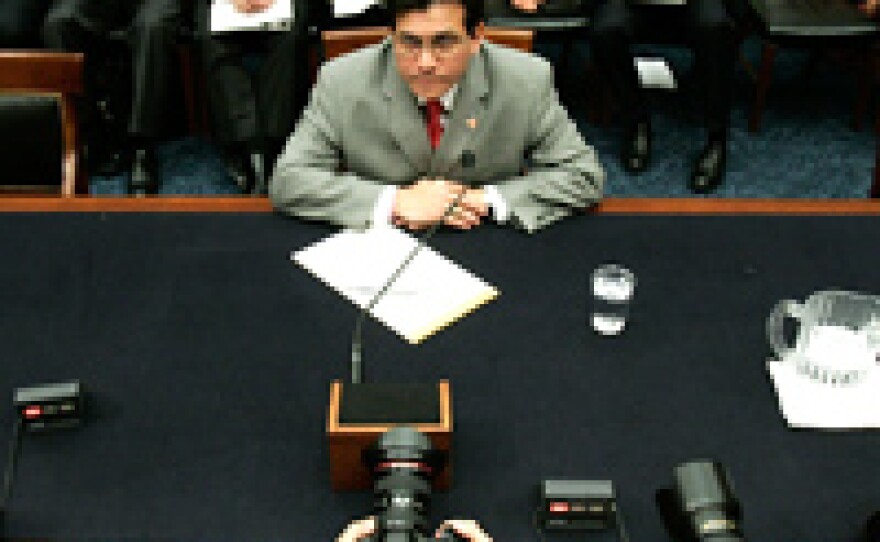
Democrats on the House Judiciary Committee pressed for more answers Thursday about the mass firing of U.S. attorneys last year. Attorney General Alberto Gonzales appeared before the committee but offered little new information.
Gonzales' performance was much the same as the one he gave three weeks ago, when he appeared before the Senate Judiciary Committee: He admitted the firings had been mishandled but insisted that they were entirely proper.
Committee Chairman John Conyers (D-MI) quickly aimed his questioning at the suspicion that the White House called the shots on the firings — for illegitimate partisan purposes.
When Conyers asked him who drew up the list of attorneys to be dismissed, Gonzales demurred, saying he had instructed his chief of staff to collect names.
"What was presented to me was a recommendation that I understood to be the consensus recommendation of the senior leadership of the department," Gonzales said.
"OK. In other words, you don't know," Conyers replied.
Democrats also pressed Gonzales about news reports of yet another federal prosecutor who has said he was forced to resign — Todd Graves, the U.S. attorney in Missouri. Gonzales has repeatedly testified that only eight federal prosecutors were asked to leave, but Graves is the ninth.
On Thursday, Gonzales denied that Graves was forced out because he had opposed a Justice Department voter-fraud prosecution brought shortly before the 2006 election. That case has since been thrown out of court for lack of evidence.
Gonzales seemed more relaxed at Thursday's hearing, probably because committee Republicans, unlike their Senate counterparts, seemed eager to play defense for the embattled attorney general. Some, like Dan Lundgren of California, argued that there was nothing wrong with the firings.
"We're acting around this place like U.S. attorneys are the product of the Immaculate Conception, and once they've been created they cannot be undone," Lundgren said.
Other Republicans, such as Wisconsin's James Sensenbrenner sought to change the subject to terrorism, or to the investigation of Democratic Rep. William Jefferson. Jefferson's home was raided two years ago and $90,000 in cash was found in the freezer. Sensenbrenner asked whether an indictment in Jefferson's case was forthcoming.
The Democrats, however, kept their focus on the firings. Rep. Mel Watt (D-NC) asked in particular about John McKay, the fired U.S. attorney in Seattle. Watt noted that the Justice Department first said that McKay had been fired because of the way he pushed an information-sharing system. But newly acquired documents show that McKay's name was on the firing list long before that incident.
Watt asked whether McKay was fired because he had refused GOP requests to bring voter-fraud charges in a closely contested gubernatorial race. Gonzales denied that charge, but he conceded there was concern about McKay's voter-fraud record.
Watt said that Gonzales' former chief of staff, Kyle Sampson, has put forward another explanation for the McKay firing: that the Justice Department was concerned McKay was too aggressive in pursuing the murderers of a federal prosecutor.
McKay, meanwhile, has offered his own theory about Gonzales' inability to say who added his or other U.S. attorneys' names to the list of those to be fired.
"If no senior Justice Department official will take responsibility — or credit, depending on how you're looking at it — then it can only come from one place, and that would be the White House," McKay told NPR member station KUOW on Thursday.
The White House, for its part, is refusing to provide witnesses to testify under oath and with transcripts.
Copyright 2022 NPR. To see more, visit https://www.npr.org. 9(MDAzMjM2NDYzMDEyMzc1Njk5NjAxNzY3OQ001))






